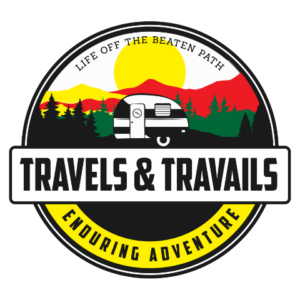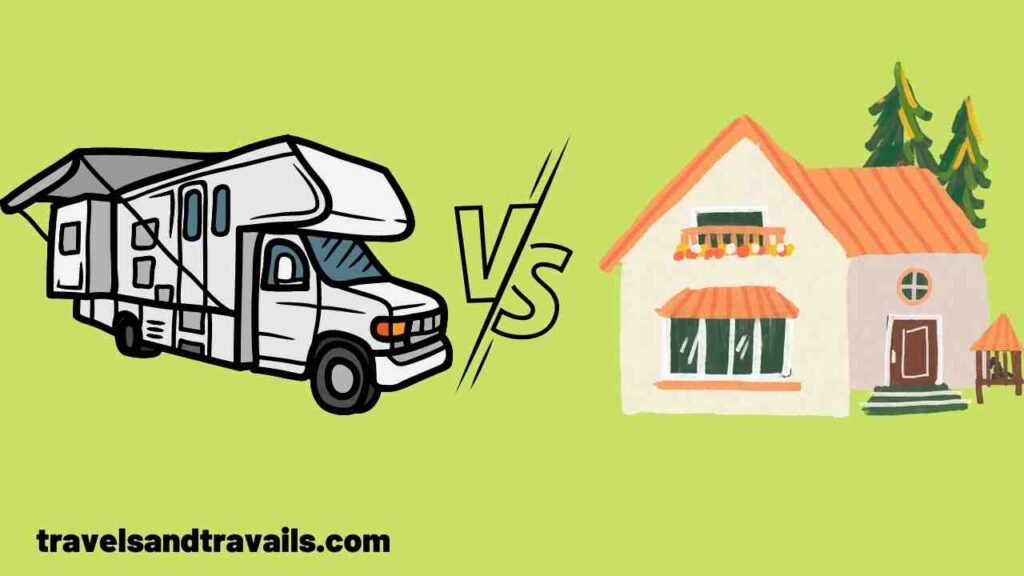
As the economy crumbles, people are considering alternatives to traditional living. The cost of owning a home and even renting has become out of reach for many Americans. But the question is, “Is it cheaper to live in an RV than a house?”
Living in an RV CAN be cheaper than living in a house. There are many factors to consider when living in an RV versus living in a home, including the following:
- Cost of RV
- Stationary vs Traveler
- Gas Mileage
- Number of Travel Days
- Where You Are Staying
- Meals
- Activities
We’ll discuss each factor.
Cost of RVs
RVs vary in type and cost more than homes do. There are travel trailers, camper vans, Class B RVs, Class C RVs, and Class A RVs.
Prices for RVs range in cost. You can purchase a used camper van or travel trailer for less than $20,000. At this price range, you’ll get something old and worn. But it can be done.
Here are the price ranges for various classes of RVs sold new:
| RV Type | Price Range New |
| Travel Trailer | $20,000 – $500,000 |
| 5th Wheel | $36,000 – $135,000 |
| Camper Van | $60,000 – $290,000 |
| Class B | $100,000 – $290,000 |
| Class C | $80,000 – $800,000 |
| Class A | $132,000 – 3+ Million |
Cash Purchase vs Financing
If you finance your RV, you’ll be paying interest, which is an additional expense.
If you can pay cash, for your RV, pay cash. Dave Ramsey was asked, by a caller, if it was okay to buy a 5th wheel instead of renting an apartment or house. Dave told the caller on the Dave Ramsey Show that it would be fine to buy the 5th wheel if he could pay cash.
One of the things that Dave said was that a new fifth wheel loses 80% of its value within three years. However, an article in CamperReport.com states that a new fifth wheel loses 25% of its value in three years.
This brings us to the next consideration for RV living costs; whether to buy a new or used one.
New vs. Used
If you purchase your RV used, you’ll probably forgo the warranty. Unless you are an RV expert, you should have the RV inspected by a certified RV inspector.
Because of their construction and constant exposure to earthquake-like forces on the road, an RV may deteriorate faster than a home. It’s prudent to have an inspection to make sure your prospective RV does not need extensive repairs.
However, if you purchase a used RV, you’ll forgo the depreciation of a new RV. My husband, who is a mechanic and a long-time RV owner, says that the “sweet spot” is to purchase a 5-10-year-old RV if the RV has been used as a weekend warrior.
You want to avoid purchasing an RV used as a full-time home.
Repair Costs

Keep in mind that RVs aren’t designed for full-time living. As far as construction and materials go, I would rate the quality as similar to a mobile home, except a mobile home isn’t frequently bouncing down the road.
RV maintenance costs are generally less costly than maintenance for a home. However, repair costs can be costly. A new transmission for a tow vehicle or RV starts out at a minimum of $4000.00 depending on your vehicle.
This is still less expensive than a $20,000 new roof for your house. Still, the house appreciates when you add a new roof, whereas an RV will still depreciate when you replace the transmission.
Depreciation
Camperreport.com wrote an in-depth article on RV depreciation. In a nutshell, the report reveals that RVs depreciate year over year. Overall, most RVs depreciate by about 22% within the first two years.
In contrast, most homes, appreciate year over year, making them an investment. If you are considering living in an RV, I would consider it closer to paying rent. Except, that when you sell, you will have some value; it just won’t be a value comparable to home ownership.
Stationary vs Traveling
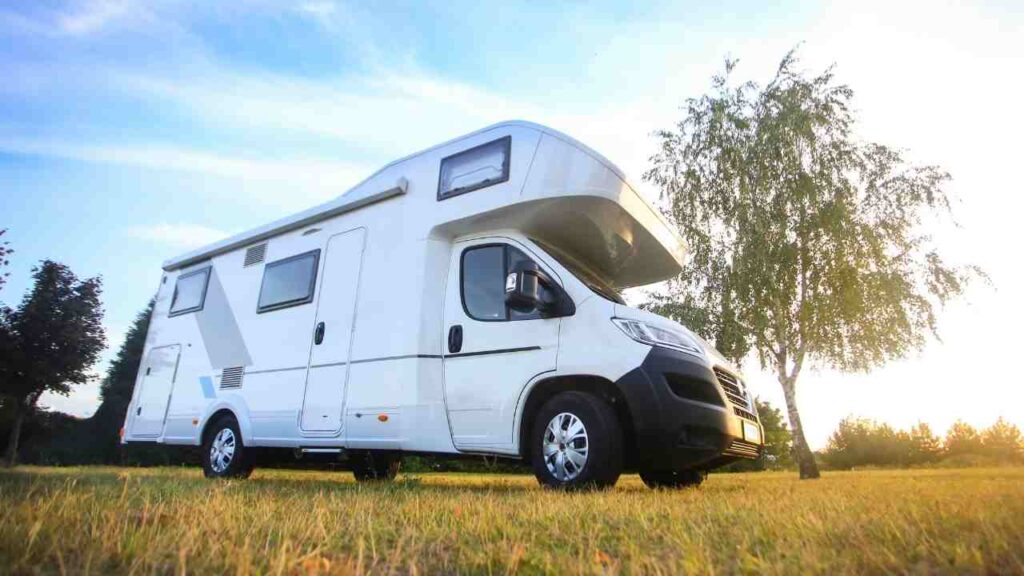
Costs will be different if you are a stationary camper versus living a traveling RV lifestyle. There are pros and cons to both situations.
If you plan to live in an RV full-time, but don’t intend to travel, fuel will cost less. However, your options for inexpensive or free places to camp are severely limited.
Still, you should be able to find a campground that offers monthly rates that are lower than the cost of a mortgage payment or rent.
If your plan is to be an RV nomad, you’ll have the option to find free or inexpensive camping, but your fuel costs will be higher. I wrote an article about how you can use apps to find low-cost or free camping.
There are ways to limit or decrease fuel costs and we’ll discuss this as well.
Gas Mileage
RVs range in fuel mileage from approximately 18 mpg to 5 mpg.
When I first started dating my husband, he had a 4-cylinder RAV-4. He bought a 13′ Scamp trailer. With the RAV-4 pulling the Scamp, we got about 18 mpg. Contrast that with his 31′ used Holiday Ramber, which got about 5 mpg.
And there is everything in between. Needless to say, if you have a smaller camper, like a small travel trailer with a small tow vehicle, or a camper van, you’ll get better gas mileage than you will with a large Class A or Class C
Number of Travel Days
If you are purchasing your RV with the intention to travel, you’ll want to consider how many days you will be on the road. That way, you can budget for gas and campgrounds.
Where You Are Staying
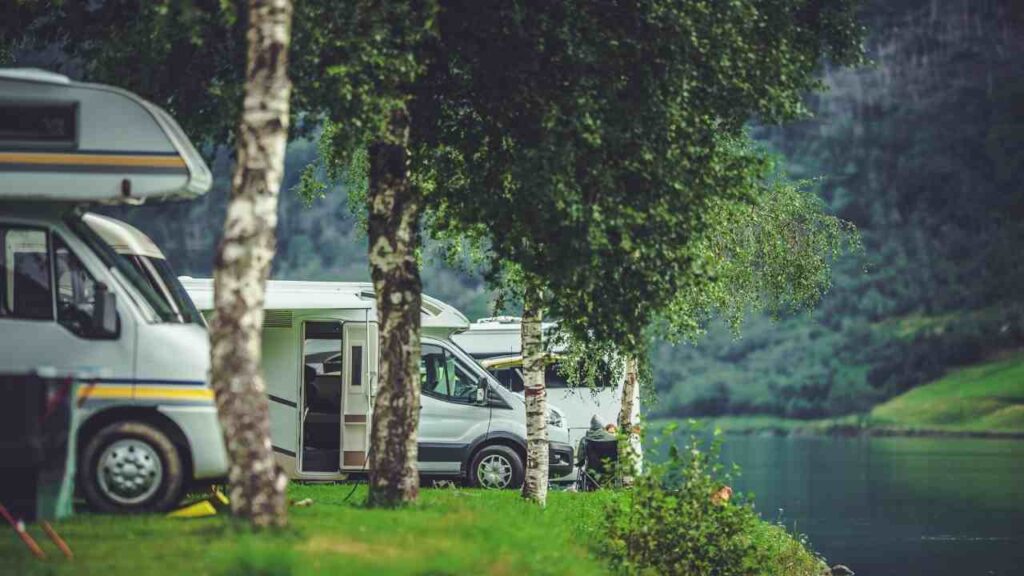
Where you plan to stay is a large factor in the costs of living in an RV.
Camping Memberships
If you are planning to stay a while and want the amenities that come with an RV setting, consider a camping membership. If you’d like to know more about camping memberships, check out our article that focuses on the pros and cons of camping memberships.
Are camping memberships worthwhile? Read the article we wrote about it here.
1000 Trails
If you want all the amenities of a camp ground and would like to stay a while, consider 1000 Trails. Thousand Trails is a camping membership that has 81 campgrounds where you can camp for up to three non-consecutive weeks in a month. The membership is somewhat like a timeshare for campers.
To find out more about 1000 Trails memberships, check out this article.
Membership fees
Beyond the initial fee, there is also an annual membership fee. This fee is akin to a maintenance fee for a timeshare.
New vs Used Membership
1000 Trails memberships can be purchased used from campgroundmembershipoutlet.com and https://www.sellmytimesharenow.com/. These brokers can help you with the purchase of the used membership, but the membership transfer is done through 1000 Trails.
There is also a Facebook group for people buying and selling 1000 Trails memberships.
Buying a used membership can potentially save you money. And, no one will know that you have a previously used membership.
Passport America
Passport America is an RV club that provides discounts on campgrounds. Currently, the annual fee for Passport America is $44. For that, you get a 50% discount on over 1200 campsites in the US, Mexico, and Canada. Passport America vets each campground before adding them to the thousands of options available. That way, you know you’ll be camping in a nice campground.
Kampgrounds of America (KOA)
Kampgrounds of America has a different type of membership. If you’d like to know more about the KOA membership and if it’s worth it for you, check out this article I wrote about it.
Boondockers Welcome
If you plan on traveling frequently, or if you just need a place to stay for the night, consider Boondockers Welcome.
With Boondockers Welcome, people post their residence as a location for you to camp with no camping fee.
Most hosts do not offer utilities. In the event that your host does offer utilities, Boondockers Welcome asks that you compensate your host if you use their utilities.
In addition, a gift to your host is a nice gesture.
The fee for Boondockers Welcome is $79.00 per year.
I’ve only had one experience with Boondockers Welcome. I requested a stay and the host declined my request, so I never had the opportunity to stay, but wanted to make you aware of the option.
Harvest Hosts

Harvest Hosts is affiliated with Boondockers Welcome, but is a different program.
With Harvest Hosts, for an annual fee, you camp for free at businesses. Businesses are wineries, distilleries, farms, breweries, and attractions. In return for the free camping, you support your host by making a purchase or donation.
If you play golf, you can also camp at golf courses for an additional fee.
Like Boondockers Welcome, Harvest Hosts is an overnight stay.
We have used Harvest Hosts as a waypoint on our journeys. We have also gone to Harvest Hosts locations for a fun overnight visit.
The cost for Harvest Hosts is $99.00 per year. Once you join, your annual membership cost is locked in as long as you continue to pay it annually.
Boondocking vs campgrounds
Campgrounds can be expensive.
Boondocking is another way to camp for free. If you choose to boondock over campgrounds, you’ll save money on campsites.
Not sure what Boondocking entails? Check out the article that I wrote for a better understanding of the terminology.
The downside of boondocking is that you won’t have access to amenities like sewer disposal, water, and electricity.
If you’re not sure if boondocking is for you, we wrote an article exploring the reasons you should consider it.
Part of Country
It’s much easier to find dispersed camping on the West Coast. However, free camping can be found all over the country if you are diligent. If you don’t mind stealth camping, you’ll have many more options.
I wrote an article outlining how you can make stealth camping work for you.
Another consideration regarding the part of the country where you’ll be traveling costs. Campgrounds in the Midwest and South are considerably less expensive than campgrounds on the West and East Coasts.
How Long You Are Staying
If you find a good deal on camping, and you stay longer, you’ll save money on gas.
Meals
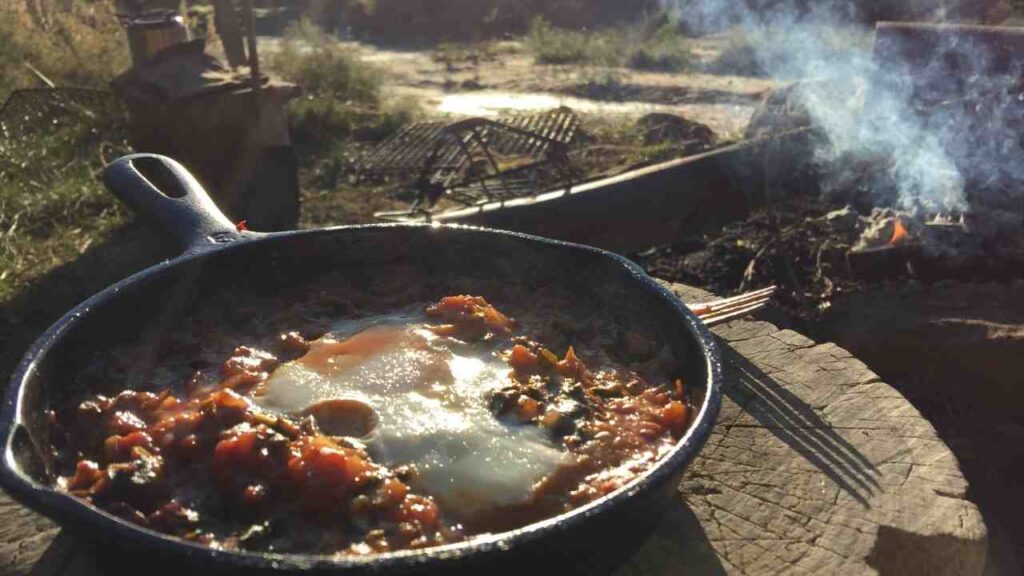
Eat In. Eating out is very expensive. The costs of fast food have skyrocketed with inflation. And, portion sizes are shrinking.
Even though grocery prices have increased, when you do your grocery shopping, you have more control over the food you buy. That way, you can shop for sales and eat lower-cost foods.
If you’d like to get some ideas for budget meals, check out Simple RV cooking with Melissa’s YouTube Channel.
Plan Meals
If you plan your meals around your grocery budget and then go shopping you’ll spend less money. You’ll also save on space since most RVs have limited storage and refrigerator space.
Activities
If you are living in an RV in order to travel, rather than just to save money, choose activities that are free. Instead of visiting paid attractions, try these activities:
- Hike
- Read a book
- Visit the farmer’s market
- Explore the town
- Visit historic sites
- Picnic
- Attend a local festival
- Go to the visitor’s center
If you have children consider some of these free activities:
- Geocaching
- Animal watching
- Swimming
- Playing in the park or playground
- Rock or fossil hunt
- Children’s outdoor games
- Make crafts
Other Considerations
There are some other advantages to living in an RV besides costs.
Chasing 70 Degrees
When you live in an RV, the weather doesn’t matter. If you don’t like the weather, you can move. Most full-time RVers move to locations where the weather is good. For example, many full-time Canadian RVers spend their winters in Florida or the desert Southwest.
Dealing with Neighbors
Don’t like your campground neighbors? If you live in an RV, you can move to a different campground.
Or even better, disperse camp away from other people.
“If you don’t like your neighbors, you can move.”
Melissa from Simple RV cooking with Melissa (YouTube)
Conclusion
RV life is a great way to live on the cheap, but it’s not a lifestyle for everyone.
Resources
The Dave Ramsey Show YouTube, Camperreport.com, Exploring the Local Life YouTube, Getaway Couple YouTube, Younger Every Day YouTube
